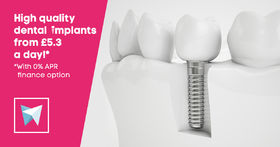Alveolitis or dry socket refers to the inflammation of the alveolus, or alveolar ridge. The alveolus is a ridge of soft bone that lies on top of your jawbone, and is located underneath the gum line. Alveolitis usually occurs after an extraction, when the blood clot fails to form over the extraction site, leaving the alveolar ridge exposed, and creating a dry socket.

This is one of the most painful things ever encountered in dentistry, and we seek to give advice on how this condition arises, and what you can do to prevent it.
Why did I get dry socket?
As mentioned above, the main problem that causes this condition is the lack of a blood clot. Without forming a blood clot, your alveolus just cannot regenerate and is left to the elements - something it is not used to. This dries out the alveolus and inflames the nerves that run through it, causing a massive pain reaction that just keeps on going and going.
Keeping the blood clot
Thus the easiest way to prevent the formation of dry socket is to keep the blood clot on the extraction site. Do not eat on that side of your face for 48 hours, and do not suck anything through a straw. Do not poke the area with your tongue, do not even swish it. When brushing, make sure you gently brush the area, but not the extraction site. The blood clot should start to heal over in around 48-72 hours, be gentle during this time. There are other factors that can cause the blood clot to never form.
If you smoke, take blood thinners or have haemophilia, it is possible that your blood clot will not form at all. Women at certain times during the menstrual cycle also have a harder time forming the blood clot, making them more susceptible to dry socket, and certain kinds of radiotherapy and the taking of bisphosphonate drugs used in cancer repression will also prevent the blood clot from forming.
What to do if you have dry socket
If you cannot see the blood clot, or if it is loose or dislodged, and you can see your alveolar ridge, call the dentist for an emergency appointment immediately. Until then, try to keep the area wet and covered, so that the nerve is less exposed. This situation can be fixed, but only by an oral surgeon.




 Call
Call Send
Send Find us
Find us Connect
Connect